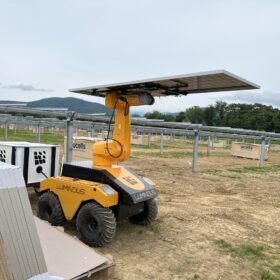Origin will provide and install 150 smart chargers to incentivise new and existing EV owners to participate in the trial. The smart chargers will be installed across residential, commercial and industrial premises of EV owners and fleets, where they will be remotely monitored and controlled via software. The smart chargers will also be integrated into Origin’s existing platform for managing distributed energy.
The $2.9 million trial will look to evaluate the benefits of and barriers to controlled smart charging, including improving our understanding of EV driver behaviour, willingness to accept third party control and what incentives are needed to encourage future participation in charge management programs.
Smart chargers will allow control of EV charging in order to avoid negative impacts on the grid, and maximise the use and value of renewable energy.
ARENA CEO Darren Miller said Origin’s trial will help to demonstrate how the Australian electricity grid can successfully integrate higher numbers of EVs while limiting costly network expansion.
“As the uptake of EVs increases, it will be important to efficiently manage the charging of vehicles, to avoid potentially costly impacts on peak demand, associated network charges and grid security issues.
“Smart charging enables charging at times when demand is lowest and electricity is cheapest, which reduces the burden on the network and the cost to the customer,” he said.
ARENA is also supporting ActewAGL’s vehicle to grid trial in Canberra with the ACT Government and Australian National University.
“It is well known that electricity costs much less than petrol in terms of powering cars and light-duty commercial vehicles. However, EVs provide additional economic opportunities for consumers through the potential of further reduced electricity costs from higher network utilisation and possible revenue generation via technologies such as vehicle-to-grid technology which ARENA is also supporting.”
“ARENA’s portfolio of EV projects is exploring various technology solutions, service providers, end users and geographies, helping to demonstrate and inform the market on how EV charging can be managed at higher levels of uptake, with the lowest cost and greatest benefit to consumers,” he said.
Origin executive general manager Future Energy and Technology, Tony Lucas, said that he hoped the trial will help them better understand how they can maximise the benefits to customers by offering products that reduce their EV charging costs, as well as manage EV charging in a way that helps with grid and network stability.
“Origin has developed a leading artificial intelligence orchestration platform, with a wide range of distributed assets, such as storage, residential air-conditioning systems, pool pumps and industrial coolers, already connected and continuing to grow.
“Using the platform, we will be able to remotely switch chargers on and off, or higher or lower, in response to changes in wholesale prices, with benefits for customers in terms of lower charging costs and the NEM as we can more efficiently manage demand and supply in the system.
“We want to get people thinking about EVs as more than just a car and saving on petrol, they will double as a battery storage in the home and be connected to virtual power plants or used for grid stabilisation, all of which will significantly reduce payback periods and improve the economics of EV ownership for many Australians,” he said.






By submitting this form you agree to pv magazine using your data for the purposes of publishing your comment.
Your personal data will only be disclosed or otherwise transmitted to third parties for the purposes of spam filtering or if this is necessary for technical maintenance of the website. Any other transfer to third parties will not take place unless this is justified on the basis of applicable data protection regulations or if pv magazine is legally obliged to do so.
You may revoke this consent at any time with effect for the future, in which case your personal data will be deleted immediately. Otherwise, your data will be deleted if pv magazine has processed your request or the purpose of data storage is fulfilled.
Further information on data privacy can be found in our Data Protection Policy.